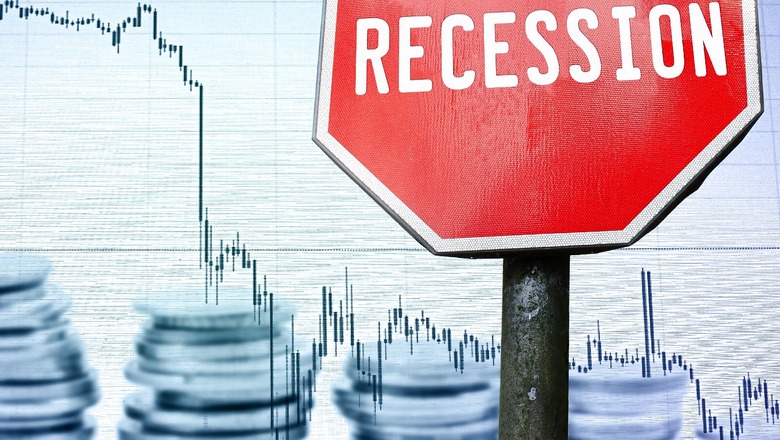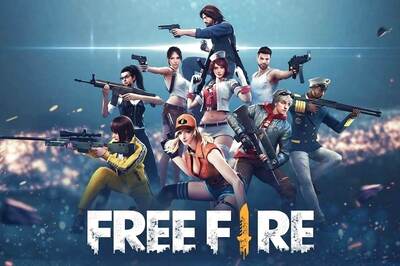
views
Another very eventful year draws to an end. A full-scale war between the two largest countries of Europe is the biggest armed conflict of the continent since World War II. Major Chinese military incursions in the territorial waters of Japan and Taiwan and increased fears of invasion are keeping the region on tenterhooks. Continued China-India face-off in Ladakh and fresh Chinese incursions in Arunachal Pradesh’s Tawang area are keeping the border tense. The sealing of another term at the helm for the Chinese strongman and paramount leader Xi Jinping makes him a near cult leader.
The world began recovering from the medical and economic fallouts of the Covid-19 pandemic, but the end of the year saw another Omicron sub-variant BF.7 surface, which is already driving a huge surge in China. There have already been over 6 million deaths due to the pandemic. The disruptions of supply chains post-Ukraine conflict resulted in one of the worst energy and food supply crisis in decades. The world also went through spiralling inflation with a fear of global recession. For the first time, the world population increased above 8 billion. Climate change remained a part of the discussions in all major global groupings.
2022 Global Wrap Up
The year began with the Regional Comprehensive Economic Partnership (RCEP), the largest free trade area in the world, come into being. The P-5 permanent members of the United Nations Security Council (China, France, Russia, the United Kingdom and the United States) issued a rare joint statement affirming that “a nuclear war cannot be won and must never be fought.” In February, China and Russia issued a joint statement opposing further NATO (North Atlantic Treaty Organisation) expansion, expressing “serious concerns” about the AUKUS security pact, and pledging to cooperate with each other on a range of issues. The full-scale Russian invasion of Ukraine began on 24 February. Within days, the West unfolded economic sanctions and attempted isolation of Russia. NATO began making aggressive anti-Russia statements and supporting Ukraine through weapons, intelligence, surveillance information, and humanitarian aid. Russia made tacit threats of using nuclear weapons to warn the West of possible intervention. Blocking Russian oil and gas resulted in an energy crisis, primarily for Europe. The United Nations’ attempts to intervene and stop the Ukraine conflict were futile. Many Ukrainians became homeless and significant numbers spilled over as refugees in neighbouring countries. The Russian flagship Moskva became the largest warship to be sunk in action since World War II, having been struck by the Ukrainian Neptune anti-ship missiles. Hypersonic weapons got used in operations for the first time. Kamikaze drones proved very cost-effective. After having captured nearly 20 percent of Ukrainian territory (including Crimea), the ground offensive is currently in a stalemate. Global food prices increased to their highest level ever. Some commodities such as wheat rose by nearly 20 percent due to the Ukraine crisis.
The Intergovernmental Panel on Climate Change (IPCC) released the final part of its Sixth Assessment Report on climate change, warning that greenhouse gas emissions must peak by 2025 at the latest and decline 43 percent by 2030, to limit global warming to 1.5°C. Europe faced a series of severe heatwaves with record high temperatures in summer, causing at least 53,000 deaths, many major wildfires, and travel disruption. At the UN Biodiversity Conference (COP15), nearly 200 countries agreed on a landmark deal to meet the planet protection targets by 2030. The transition away from fossil fuels seems on track. Net-zero greenhouse-gas emissions could be within sight by 2050 if all goes as per plan.
Former Prime Minister of Japan, Shinzo Abe, was assassinated in July while giving a public speech in the city of Nara, Japan. The other big personalities who passed away in 2022 were Mikhail Gorbachev, the 8th and final leader of the Soviet Union and Nobel Peace Prize recipient; and Elizabeth II, Queen of the United Kingdom and the other Commonwealth realms.
China conducted its largest-ever military exercise around Taiwan in response to a visit by Nancy Pelosi, Speaker of the United States House of Representatives, the highest-ranking US official to visit Taiwan since the 1990s. Meanwhile, Azerbaijan attacked Armenian positions and occupied certain areas along the border. There were significant fatalities on both sides. Protests erupted in Iran following the death of Mahsa Amini in the custody of the country’s “morality police”. They don’t seem to be dying down.
NASA’s DART (Double Asteroid Redirection Test) was made to hit the asteroid Dimorphos in the first test of potential planetary defence. NASA launched Artemis 1, the first uncrewed launch of its Space Launch System, the most powerful rocket ever launched into orbit. The onboard Orion capsule orbited the Moon before returning to Earth, as a demonstration of planned human missions.
India’s neighbourhood saw the ouster of PM Imran Khan’s government in Pakistan. A massive earthquake measuring 6.2 struck the Durand Line between Afghanistan and Pakistan, killing at least 1,163 people. Pakistan faced floods in August, inundating nearly one-third of the country and over 1,000 deaths. Sri Lankan Prime Minister Mahinda Rajapaksa was forced to resign after massive protests against his government for the failure of the economic policies and serious financial crisis. Prime Minister Narendra Modi commissioned India’s first indigenous aircraft carrier, INS Vikrant, in Kochi. And, India got its second Chief of Defence Staff (CDS) in General Anil Chauhan.
Global Crystal Gazing 2023
After the USA moved out of Afghanistan and actively began supporting Ukraine in its war with Russia, the global “War on Terror” seems to have taken a backseat. The Ukraine conflict has meant life and economic loss for Ukrainians. There is a level of “war fatigue” setting in. By spring, I think it will be time to sit at the negotiating table and begin serious bargaining. Russia is unlikely to let go of the occupied territories. Ukraine joining NATO will remain an unacceptable situation for Russia’s security. Some security assurances will have to evolve for Ukraine. The situation is well past the Minsk agreements and they are unlikely to be revisited. A compromise could be Ukraine joining European Union (EU) and not NATO. Russian commitments would be required for no further eastward claims in Ukraine or other former Soviet republics.
Vladimir Putin, who sees the Ukraine war as a part of a broader struggle against Western powers which he says are intent on destroying Russia, would also seek assurance. The 32-member NATO inducted Finland and Sweden in July 2022 and currently recognises Bosnia and Herzegovina, Georgia, and Ukraine as aspiring members as part of their “Open Doors” enlargement policy.
The dual containment strategy of the US-led West, by simultaneously taking on Russia and China, is being questioned by many. The US has to clearly get the attention back to the Indo-Pacific. Russia’s military might and immense natural wealth, and China’s financial muscle can be a formidable combination. Russia and China are not natural allies. It will be in USA’s interest to wean back Russia from Chinese arms. While China was making pro-Russia statements initially, it has now become more nuanced in protecting its global interests. The energy crisis in the aftermath of the Ukraine conflict has exposed internal divisions within the EU, NATO, and G7 groupings. The pro-Russia problematic NATO member Turkey has been an effective interlocutor. An early end to hostilities in Ukraine will be in the global interest.
Europeans are a net loser of the Ukraine war. They have currently lost cheap energy source. The conflict has moved closer to them. The defence budgets will have to go up, meaning lesser funds for economic and human development. It also means greater dependence on the US. Europe has shown very uncharacteristic cohesion in response to the Ukraine conflict. This unity can’t carry on for long. The energy shocks in 2023 could be much worse than the current year. This could have a serious economic impact, especially on the cost of living, and that could have political ramifications. It will be in the European interest that the war comes to an end. After all, declining power Russia has not threatened any European country and nor it is in such a position. The US military-industrial complex has been the clear gainer having had rocketing sales. But with immediate gains realised, their interest in the Ukraine war should also reduce. Putin’s continued use of nuclear cards and fear of nuclear war and energy-hungry Europe would keep the West from escalating further and may reduce aid to Ukraine in the future. However, Putin will be in deep trouble if the Russian military flounders in Ukraine, in response to continued Western support to Ukraine. PM Modi has spoken to both Presidents — Putin and Zelenskyy — to convey that this was “not the era for wars”, and offered support to end it. It should be in everyone’s interest to end the war by spring 2023.
China has been making very aggressive intrusions into the Japanese and Taiwan Air Defence Identification Zone (ADIZ) and Exclusive Economic Zone (EEZ). I feel that these are intimidating tactics and China is far from ready for an invasion of Taiwan. It will be their strategy to create a political upheaval in Taiwan and get a pro-China party in power. Such attempts are known to being made. 2023 may see a stand-off in Taiwan Strait, short of full war. It will be a test of the US resolve to defend a democratic Taiwan. It will be in the country’s interest to strengthen alliances and make things economically difficult for China through critical technology denial and supply chain diversions. China’s preoccupation with the spreading pandemic, slowing economy and demographic issues would keep them head-down.
Washington’s presence in West Asia is also facing resistance, also due to Chinese influence as a counterweight. Saudi relations with the US have been strained. Many analysts feel that 2023 could see Iran becoming a de facto nuclear-weapons state. They seem to have accumulated enough weapon’s grade uranium to make at least one bomb. They could also take advantage of global preoccupation with Ukraine and Indo-Pacific to assemble one. However, they are unlikely to do a nuclear test. The US has repeatedly said that force is the last option to keep Tehran away from its bomb.
The US has been losing its hold over South America, once considered its backyard. Colombia is currently the only major economy in South America that does not have China as its largest trading partner. But all this may also change in 2023. China’s presence in Africa has also grown by leaps and bounds. Also, Burkina, Faso and Mali have regimes that will not let democracy return and are likely to tacitly support terrorist organisations like Al-Qaeda.
Digital space is likely to see greater action and contest. Authoritarian China and Russia have realised the need to break the American hold over the internet through their own alternatives. They also have independent global satellite navigation systems. Notwithstanding the current strength of the US Dollar vis-à-vis other currencies, its dominance as an instrument for international trade is being challenged. The dollar’s share of foreign-exchange reserves is declining. More countries including China, India, and Indonesia are encouraging digital payments. Digital space will increasingly be used as a weapon. Maintaining a free and open internet would see its challenges. Cyberspace will require newer strategies by all major powers.
Seeing the US tighten controls over technology, Xi Jinping has made it clear that he intends to go full strength on developing indigenous technological capabilities. China is also undercutting to throttle US exports and cut revenues of US companies. This is forcing some European companies to woo China, causing a strategy rift with the US.
Is the world heading for a global recession as the cost of energy and food is rising? Many developing countries are facing a debt servicing crisis. This is getting exasperated with interest rates going up. The risk-averse lenders are less supportive of bailouts and thus creating conditions for sovereign and corporate defaults. Defaults, in turn, could have broader knock-on effects such as stoking authoritarianism and insecurity in politically fragile countries. The poorest countries will fare the worst with these trends in the coming year. 2023 will be a trying time for many.
The resurfacing of Coronavirus would need a close watch. A major wave requiring lockdowns would mean the world going into an economic recession. I feel that many countries like India, the USA and Europe have earlier had severe waves and have developed reasonable immunity. How it pans out in China will affect the world economy.
India in 2023
China has followed a hit-on-the-knuckles approach with India. It does not want India to commit heavily in what it perceives as an anti-China grouping called Quad. After two major border incidents in Galwan and recently in the Tawang area, China has been making overtures to want to talk to India. But the Army Commander-level talks have not given India sufficient confidence in Chinese intentions. India will adopt a wait-and-watch approach while continuing to strengthen military ground positions and border infrastructure. Indian Army and Air Force are sitting fairly strong. Any large-scale conflict is unlikely between India and China.
Pakistan is going through major political and economic strife. The separatist movements and terrorism are hitting them internally. Pakistan’s proxy war in Jammu and Kashmir and parts of Punjab has also slowed down. India has also managed much better integration of Kashmir since Article 370 was repealed. India’s border with Pakistan is likely to be secure. At best, there will be political sloganeering as Pakistan goes into an election year. Meanwhile, the US has once again begun engaging with Pakistan whose geostrategic location is a gift of geography.
India would hold the presidency of the Shanghai Cooperation Organisation (SCO) till September 2023. It will be significant for India to showcase its global position and status. PM Modi has planned continuous grand events across the country throughout the year. It could also create conditions for a thaw in the ongoing dispute with China, the other major SCO player. Geopolitically, New Delhi could use the opportunity to further develop and showcase its Central and West Asia relations as an extended neighbourhood. With the entry of Iran as a new member, the North-South Corridor could be a point of discussion. Building consensus among the SCO members to tackle terrorism and extremism will be a challenge. Yet, with Russia, China and Iran being players, it cannot be allowed to drift to an anti-West grouping.
India holds the Presidency of the G20 from December 1, 2022, to November 30, 2023. The 43 heads of delegations, the largest-ever in G20, will be participating in the New Delhi Summit in September next year. The theme of India’s G20 presidency is “Vasudhaiva Kutumbakam” or “One Earth, One Family, One Future”. Disaster risk reduction; green development; climate finance; accelerated, inclusive & resilient growth; accelerating progress on sustainable development; technological transformation & digital public infrastructure; multilateral institutions for the 21st century; women-led development, are some of the initiatives India has flagged for the year. The SCO and G20 presidency should also support New Delhi’s understanding of multilateralism. These are small steps for India to find a place on the global high table and membership of the UNSC. Finally, India has to build financial systems resilience to shield it against global storms. Atmanirbharta has to be pushed in most spheres and especially in defence production.
The writer is Director General, Centre for Air Power Studies. The views expressed in this article are those of the author and do not represent the stand of this publication.
Read all the Latest Opinions here


















Comments
0 comment